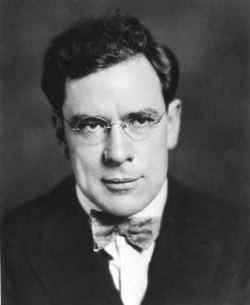Maxwell Anderson
| Maxwell Anderson | |
|---|---|
 |
|
| Born | James Maxwell Anderson December 15, 1888 Atlantic, Pennsylvania, US |
| Died | February 28, 1959 (aged 70) Stamford, Connecticut, US |
| Pen name | John Nairne Michaelson |
| Occupation | Playwright |
| Alma mater |
University of North Dakota Stanford University |
| Spouse |
Margaret Haskett (1911–1931†) Gilda Hazard (1954–1959) |
| Partner | Gertrude Higger (1933–1953†) |
| Information | |
| Magnum opus | Both Your Houses |
| Awards | Pulitzer Prize for Drama (1933) |
James Maxwell Anderson (December 15, 1888 – February 28, 1959) was an American playwright, author, poet, journalist and lyricist.
Anderson was born in Atlantic, Pennsylvania, the second of eight children to William Lincoln "Link" Anderson, a Baptist minister, and Charlotte Perrimela Stephenson, both of Scots and Irish descent. His family initially lived on his maternal grandmother Sheperd's farm in Atlantic, then moved to Andover, Ohio, where his father became a railroad fireman while studying to become a minister. They moved often, to follow their father's ministerial posts, and Maxwell was frequently sick, missing a great deal of school. He used his time sick in bed to read voraciously, and both his parents and Aunt Emma were storytellers, which contributed to Anderson's love of literature.
During a visit to his grandmother's house in Atlantic, at age 11, he met the first love of his life, Hallie Loomis, a slightly older girl from a wealthier family. His autobiographical tale, Morning, Winter and Night told of rape, incest and sadomasochism on the farm. It was published under a pseudonym, John Nairne Michealson, to prevent offending family. The Andersons bounced between Andover, Ohio, Richmond Center, Ohio, Townville, Pa., Edinboro, Pa., McKeesport, Pa., New Brighton, Pa., Harrisburg, Pa., to Jamestown, North Dakota in 1907, where Anderson attended Jamestown High School, graduating in 1908.
As an undergraduate, he waited tables and worked at the night copy desk of the Grand Forks Herald, and was active in the school's literary and dramatic societies. He obtained a BA in English Literature from the University of North Dakota in 1911. He became the principal of a high school in Minnewaukan, North Dakota, also teaching English there, but was fired in 1913 for making pacifist statements to his students. He then entered Stanford University, obtaining an M.A. in English Literature in 1914. He became a high school English teacher in San Francisco: after three years he became chairman of the English department at Whittier College in 1917. He was fired after a year for public statements supporting Arthur Camp, a jailed student seeking status as a conscientious objector.
...
Wikipedia
